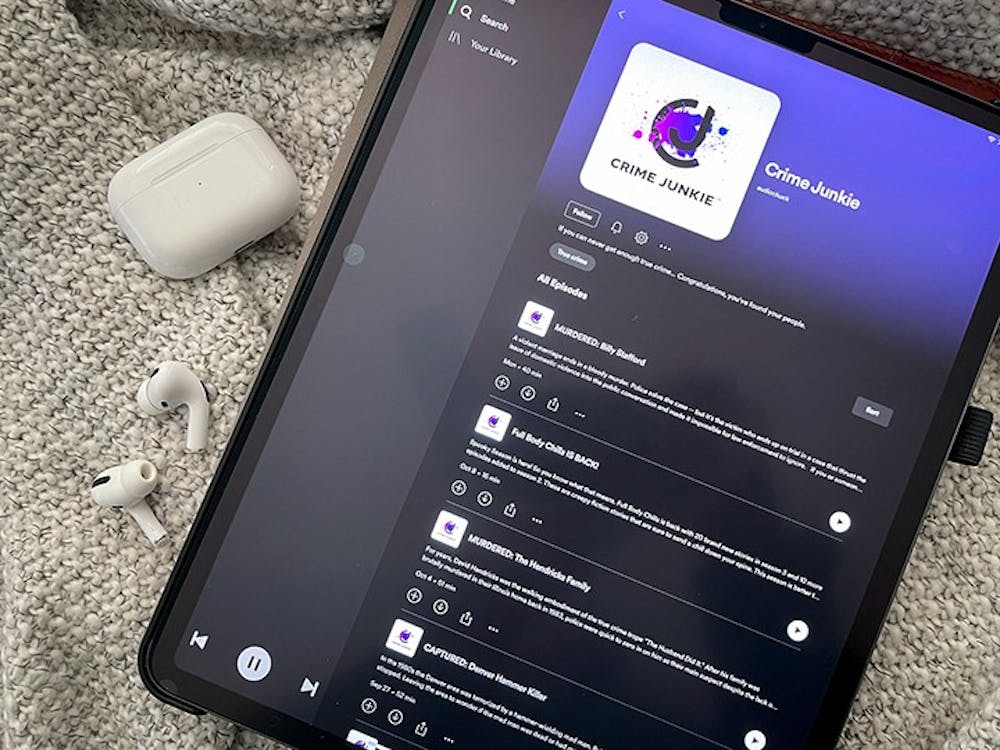While true crime podcasts deal with sensitive subject matter, they can be used for educational purposes and give useful information on life-saving incidents, as well as examples of what you can do in the future to stay safe through the examination of past cases.
There has always been a market for morbidly curious people. Most people will always be interested in things that scare them or have a gruesome takes on the mundane. A new addition to this not-so-niche group are true crime podcasts.
Often considered the OG true-crime podcast, "Serial" took the world by storm by telling one story throughout an entire season. The first season focused on attempting to prove Adnan Syed's innocence after he was convicted for his ex-girlfriend's murder. This podcast aided others in becoming popular, such as "Crime Junkie," My Favorite Murder" and "Morbid: A True Crime Podcast".
Podcasts, such as Crime Junkie, take each episode to focus on a different sort of case, such as a serial killer, mysterious murders or missing persons. Often the hosts will go into great depth about what happened in the cases and can get highly graphic and disturbing, especially when the case involves children.
One question comes to mind when thinking about the popularity of these podcasts: Is obsessively listening to these programs about murder and sexual assault sensationalizing violence?
Our society glazes over the victims of these monsters in favor of sensationalizing the man behind the murders.
How many victims can you name from "famous" serial killers, such as John Wayne Gayce or Jeffery Dahmer? Instead of memorializing the victims, the media, especially in old cases, oftentimes only names the killer. There must be a shift from glorifying the evil of the perpetrator to focusing on the experience and lives of the victims.
Even though some podcasts focus on those gory details that we don't need to know, they also serve as an informational tool. They talk about the victims and analyze the psychology behind why someone would do something so awful. They look at cases that might be wrongful convictions and sometimes provide very useful information that could help listeners know what could be going on in their community if the case or podcast is local and help authority figures get information from the public if the case is ongoing.
Other podcasts, such as "Serial," take a look at old cases that might have been false convictions. A local podcast, "Undisclosed," by Colin Miller, a professor at the University of South Carolina School of Law, called investigates wrongful convictions. He looks into the investigation, the trial and the verdict and brings up new evidence that didn't make it into court. This has led to over 10 exonerations so far. Miller, along with two other attorneys, teach listeners about the legal system.
"A big component of our podcast is teaching the public about different legal concepts, how the criminal justice system works, so they can better understand the system if they become jurors, or they are trying to work on legislation or just trying to understand what's going on with a loved one if they are involved in the criminal justice system," Miller said.
Recently, a case that has struck the media is the disappearance and death of social media influencer Gabby Petito. This case got national attention, and many knew who Petito and boyfriend Brian Laundrie were. This overall knowledge helped new leads get back to the authorities, such as a couple finding Petito's van because they saw it on the news.
Another thing that true crime podcasts can provide is life-saving information and tips. Crime Junkie's motto is 'stay weird, stay rude and stay alive.' In its episodes, it urges listeners, especially women, that it's okay to be rude to people who make you uncomfortable. It's okay to be a little weird if that means staying alive.
A narrative that most shows try to push is sticking to your gut. It's probably in your best interest to say no to the creepy "injured" man asking for assistance.
Listening to true crime podcasts regularly should not be for pure entertainment, but to inform yourself about the past and to educate yourself on what can be done differently in the future.

